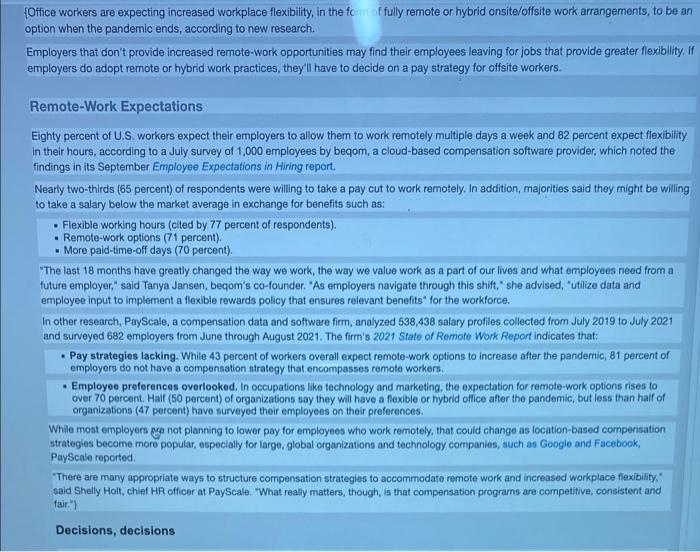[Office workers are expecting increased workplace flexibility, in the form of fully remote or hybrid onsite/offsite work arrangements, to be an option when the pandemic ends, according to new research. Employers that don't provide increased remote-work opportunities may find their employees leaving for jobs that provide greater flexibility. If employers do adopt remote or hybrid work practices, they'll have to decide on a pay strategy for offsite workers. Remote-Work Expectations Eighty percent of U.S. workers expect their employers to allow them to work remotely multiple days a week and 82 percent expect flexibility in their hours, according to a July survey of 1,000 employees by begom, a cloud-based compensation software provider, which noted the findings in its September Employee Expectations in Hiring report. Nearly two-thirds (65 percent) of respondents were willing to take a pay cut to work remotely. In addition, majorities said they might be willing to take a salary below the market average in exchange for benefits such as: Flexible working hours (cited by 77 percent of respondents). Remote-work options (71 percent). More paid-time-off days (70 percent). "The last 18 months have greatly changed the way we work, the way we value work as a part of our lives and what employees need from a future employer," said Tanya Jansen, begom's co-founder. "As employers navigate through this shift," she advised, utilize data and employee input to implement a flexible rewards policy that ensures relevant benefits for the workforce. In other research, PayScale, a compensation data and software firm, analyzed 638,438 salary profiles collected from July 2019 to July 2021 and surveyed 682 employers from June through August 2021. The firm's 2021 State of Remote Work Report indicates that: . Pay strategies lacking. While 43 percent of workers overall expect remote-work options to increase after the pandemic, 81 percent of employers do not have a compensation strategy that encompasses romote workers. Employee preferences overlooked. In occupations lika technology and marketing, the expectation for remote-work options rises to over 70 percent. Hall (50 percent) of organizations say they will have a flexible or hybrid office after the pandemic, but less than half of organizations (47 percent) have surveyed their employees on their preferences. While mont employers na not planning to lower pay for employees who work remotely, that could change as location-based compensation strategies become more popular, especially for large, global organizations and technology companies, such as Google and Facebook, PayScale reported "There are many appropriate ways to structure compensation strategies to accommodate remote work and increased workplace flexibility, said Shelly Holt, chlaf HR officer at PayScale. "What really matters, though, is that compensation programs are competitive, consistent and fair") Decisions, decisions Besides the motivational aspect of creating a pay structure, there are obviously other considerations HR professionals need to consider, especially when it comes to a pay strategy that encompasses remote, hybrid and/or strictly office-based, at the work-site employees. As the article above mentions, the size of the organization and the expected expansion of the organization will be but one factor. To adjust pay or not to adjust pay, that is the question, your overall question. How would the business needs affect your decision as a HR Professional? How would the company's resources affect your answer? What ethical considerations must be taken into account? What are the HR Implications of a geographically based compensation plan? Could this have an effect on talent acquisition? Be detailed. To take it from meets expectations to exceeds expectations, cite (summarize and link to) an example of an organization's response (not mentioned in the article above) and explain what HR professionals can learn from this [Office workers are expecting increased workplace flexibility, in the form of fully remote or hybrid onsite/offsite work arrangements, to be an option when the pandemic ends, according to new research. Employers that don't provide increased remote-work opportunities may find their employees leaving for jobs that provide greater flexibility. If employers do adopt remote or hybrid work practices, they'll have to decide on a pay strategy for offsite workers. Remote-Work Expectations Eighty percent of U.S. workers expect their employers to allow them to work remotely multiple days a week and 82 percent expect flexibility in their hours, according to a July survey of 1,000 employees by begom, a cloud-based compensation software provider, which noted the findings in its September Employee Expectations in Hiring report. Nearly two-thirds (65 percent) of respondents were willing to take a pay cut to work remotely. In addition, majorities said they might be willing to take a salary below the market average in exchange for benefits such as: Flexible working hours (cited by 77 percent of respondents). Remote-work options (71 percent). More paid-time-off days (70 percent). "The last 18 months have greatly changed the way we work, the way we value work as a part of our lives and what employees need from a future employer," said Tanya Jansen, begom's co-founder. "As employers navigate through this shift," she advised, utilize data and employee input to implement a flexible rewards policy that ensures relevant benefits for the workforce. In other research, PayScale, a compensation data and software firm, analyzed 638,438 salary profiles collected from July 2019 to July 2021 and surveyed 682 employers from June through August 2021. The firm's 2021 State of Remote Work Report indicates that: . Pay strategies lacking. While 43 percent of workers overall expect remote-work options to increase after the pandemic, 81 percent of employers do not have a compensation strategy that encompasses romote workers. Employee preferences overlooked. In occupations lika technology and marketing, the expectation for remote-work options rises to over 70 percent. Hall (50 percent) of organizations say they will have a flexible or hybrid office after the pandemic, but less than half of organizations (47 percent) have surveyed their employees on their preferences. While mont employers na not planning to lower pay for employees who work remotely, that could change as location-based compensation strategies become more popular, especially for large, global organizations and technology companies, such as Google and Facebook, PayScale reported "There are many appropriate ways to structure compensation strategies to accommodate remote work and increased workplace flexibility, said Shelly Holt, chlaf HR officer at PayScale. "What really matters, though, is that compensation programs are competitive, consistent and fair") Decisions, decisions Besides the motivational aspect of creating a pay structure, there are obviously other considerations HR professionals need to consider, especially when it comes to a pay strategy that encompasses remote, hybrid and/or strictly office-based, at the work-site employees. As the article above mentions, the size of the organization and the expected expansion of the organization will be but one factor. To adjust pay or not to adjust pay, that is the question, your overall question. How would the business needs affect your decision as a HR Professional? How would the company's resources affect your answer? What ethical considerations must be taken into account? What are the HR Implications of a geographically based compensation plan? Could this have an effect on talent acquisition? Be detailed. To take it from meets expectations to exceeds expectations, cite (summarize and link to) an example of an organization's response (not mentioned in the article above) and explain what HR professionals can learn from this








